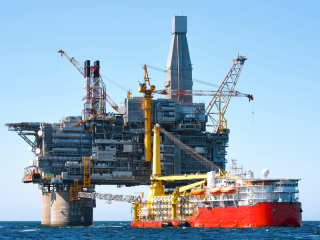
In this article, we'll go through the journey of fuel as it makes its way from deep underground, across the world and into our stations ready to be pumped.
Fuel was first discovered as a by-product of refining crude oil to make kerosene for lights. At the time of its discovery, there was no use for gasoline, so it was burnt and converted to a gaseous fuel for gas lights, or simply discarded.
Warning – Please do not attempt to recreate this process at home or work, even with fuel prices still at a high, just stick to using your Right Fuel Card.
Finding the source
The first and most important part of the process of making fuel is to find a source of crude oil, which is the decomposed bodies of plankton and other microscopic life that died millions of years ago.
Crude oil can be found in natural reservoirs deep underground or undersea and is discovered using different tools used by geologists to measure changes in the earth, which can then lead them to sources of crude oil.
The process of extraction starts by drilling a well, deep enough into the ground to pump the crude oil back up and stored before it is ready to be transported to refineries.
Getting to the refinery
Once the crude oil has been extracted, it is stored in large tanks until it is ready to be transported via pipelines, trains, ships or barges.
All modes of transport for crude oil face potential risks to the environment with some having bigger risks than others. Crude oil that is being shipped to oil refineries has the risk of oil spills which can have a detrimental effect on sea life. Crude oil that is transported via train can potentially risk lives and damage property. Should a train derail it could spark a widespread fire as crude oil is highly flammable.
Time to refine
Here in the UK, we have six major oil refineries which are large-scale industrial factories that convert crude oil to make commercial products. They are open 24/7 and are only shut down for maintenance and repair, typically around when refineries switch from summer fuel to winter fuel and vice versa.
The difference between the two is that the winter fuel blend is formulated to prevent wax crystals from forming at lower temperatures. The summer fuel blend is optimised due to its slightly higher viscosity.
All refineries in the UK are different to each other as over time, the demand for fuel and other by-products of crude oil has increased, meaning that to accommodate this growth, new more modern refineries have had to be built.
Once the crude oil has arrived at the refineries it has to go through 5 processes in order to extract the diesel and petrol then it will be ready for transportation again.
The crude oil is first heated in a furnace and sent to a distillation tower.
Fractional Distillation breaks down crude oil into various components which are lubricating oil, butane, propane, gasoline, kerosene, gas oil and diesel fuel.
Conversion and reforming improve the quality of these streams and adjust the yields to meet market demand.
Desulphurisation reduces the sulphur in the streams to the required level.
Blending of the gasoline with additives to improve performance and meet emissions standards. Additives can include detergents, antioxidants and oxygenates.
Transporting the goods
Once the fuel is ready to be transported for the second time, it is carried via pipelines, sea tankers, rail or road from the refineries to regional distribution centres, storage facilities, petrol stations or end users such as airports and here is where the fuel will either be put to use or transported further to petrol stations.
This is often where the journey of fuel comes to an end momentarily before it is pumped into our vehicles and used up by the engines to get us to wherever we may be heading.




